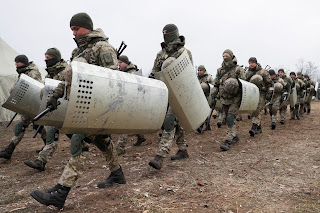The Debate on the Left Over Whether to Raise the Issue of NATO Expansionism in the Context of the Russian Invasion of Ukraine.
This is the basic claim of an
article in New Politics by Taras Bilous titled “A Letter to the Western Left
from Kyiv” that begins with the words “The
‘anti-imperialism of idiots’ meant people turned a blind eye to Russia’s
actions.” Bilous takes issue with Jacobin staff writer Branko Marcetic (as well
as Tariq Ali) for articles in Jacobin that criticized NATO expansionism and in
doing so were allegedly soft on Russia. In fact, Marcetic and Jacobin magazine
have condemned the Russian invasion (and Putin himself) in no uncertain terms.
The argument for raising the issue of NATO
expansion is somewhat weakened by the fact that there is a secondary motive
that Putin articulates, namely the claim that Ukraine forms part of Greater
Russia, an argument that explicitly negates the principle defended by Lenin of
the right of self-determination and specifically the right of succession. Putin
has defended the invasion on the basis of the threat posed by NATO expansion but
also on the basis of the historical justification of the notion of a Greater Russia.
Nevertheless, the major motive for the invasion is the fear of NATO expansion
and what it implies with regard to Russia's legitimate security concerns. That
is, NATO expansion represents an existential threat to Russia, an undeniable
fact ignored by those on the left who oppose raising the issue of NATO at this
moment. Ukraine's membership in NATO would inevitably result in the
installation of nuclear bases, a reality exacerbated by Trump's withdrawal from
the Intermediate-Range Nuclear Forces (INF) Treaty, in
effect since 1987. It is no exaggeration to say that Russia’s very existence is
threatened by missile installations in neighboring countries. In a matter of a
few minutes, Russia could be blown off the face of the earth. Furthermore,
membership in NATO means that the U.S. considers an attack on that nation as an
attack on US soil. Any border skirmish (such as the one that set off the Korean
War) would necessarily involve the US militarily. In short given this very real
reality, which Russian diplomacy has harped on ever since the first wave of NATO
expansion in the 1990s under Yeltsin, the issue of NATO expansion cannot be
placed on a par with Putin's romantic notions of a Greater Russia.
The anti-war movement needs to
raise the issue of NATO expansion because the only way that the Ukrainian
conflict can be resolved is through an agreement that places limits on NATO. Furthermore,
the only long-term solution to the threat of war is the abolition of NATO,
which ever since the fall of the Soviet Union has been transformed from a defensive
pact to an offensive one.
Laying beneath the discussion is another debate of
a broader scope and of greater significance in the long run, namely Is Russia
an imperialist nation? The word imperialist is getting thrown around a lot in
the context of the Ukrainian conflict and in effect it is being used as
synonymous with expansionism. First, the issue of imperialism has to be
divorced from the issue of the lack of democracy in Russia. Imperialism cannot
be equated with authoritarian rule. Empires from that of Rome to Great Britain
in the nineteenth century to the U.S. today have been considered democratic.
Second, if the Russian invasion of Ukraine is essentially about security
concerns, as I have argued here, then the word "imperialism" is
misleading. Third, Russian interventionism at the world level is minuscule
in comparison to U.S. interventionism. Russiagate was kid's stuff at best in
comparison to the U.S.'s ongoing violation of national sovereignty on multiple
fronts throughout the world. Furthermore, no country comes close to matching
the US's military presence throughout the world in the form of 750 military
bases and 200,000 troops stationed on foreign soil, as well as the type of
military pact that NATO represents and that Washington's Pivot to Asia strategy
potentially represents.


0 Comments:
Post a Comment
Subscribe to Post Comments [Atom]
<< Home